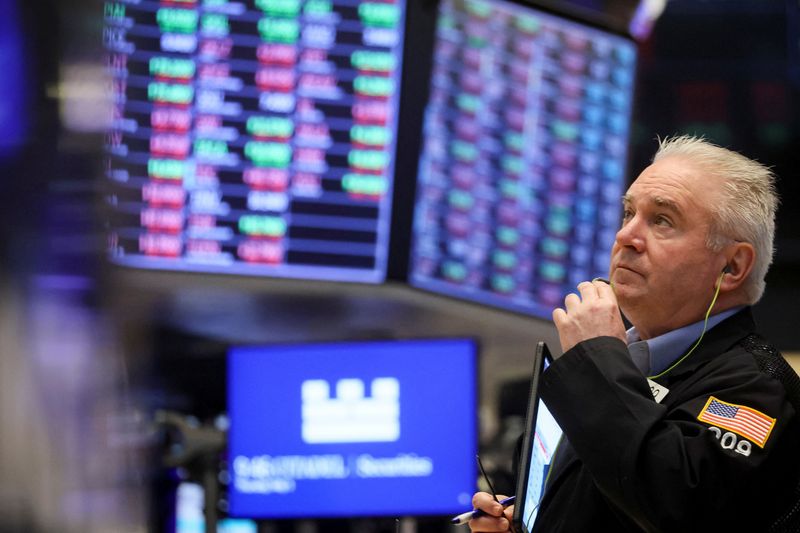By Geoffrey Smith
Investing.com -- The Federal Reserve will publish the minutes of its latest policy meeting, while durable goods orders for April are also due. The euro falls as ECB policymakers row back talk of aggressive interest rate hikes. Nelson Peltz may be about to launch a takeover of Wendy's, while Nvidia will report after the close. Russia edges closer to a manufactured debt default, and U.S. government data will show how well-stocked the nation's gas stations are ahead of the start of the summer driving season. Here's what you need to know in financial markets on Wednesday, 25th May.
1. Fed minutes due as Burry revives memories of 2008
The Federal Reserve will publish the minutes of its last meeting at 2 PM ET (1800 GMT). The release risks, being somewhat backward-looking, inasmuch as the meeting took place at a time when markets were still focused on inflation risks rather than recession risks.
The latter have been dominant this week, as profit warnings and weak home sales data have pushed bond yields down and punished consumer and growth-focused stocks. Memories of the last recession were evoked on Tuesday by a somewhat Delphic tweet by Michael Burry, famous for his role in shorting subprime credit in 2007-08.
“As I said about 2008, it is like watching a plane crash. It hurts, it is not fun, and I'm not smiling,” Burry said, without specifying what “it” was.
Before the Fed, there will also be durable goods data for April, which may show a further slowdown on consumer durable spending, in particular, if Best Buy’s profit warning on Tuesday is anything to go by.
2. Euro falls as ECB hawks step into line; RBNZ hikes by 50bps
The euro fell as European Central Bank hawks and swing voters fell into line behind ECB president Christine Lagarde’s call for only gradual interest rate increases.
Dutch central bank governor Klaas Knot and his Finnish counterpart Olli Rehn, a key centrist on the governing council, indicated that they would both be satisfied with only a 25 basis point hike at the bank’s meeting in July. Rehn, in particular, flagged the big downward revisions to this year’s growth forecasts that are likely when the ECB meets next month.
European data overnight were mixed, with French unemployment rising a little, but Spain’s producer price inflation still roaring ahead at an annual rate of 45%.
Elsewhere overnight, the Reserve Bank of New Zealand hiked its key rate by 50 basis points to 2%.
3. Stocks set for flat opening; Wendy’s in focus
U.S. stock markets are set for a mixed opening, with technology and growth stocks unable to claw back much of Tuesday’s underperformance.
By 6:20 AM ET, Dow futures were down 18 points, or less than 0.1%, while S&P 500 futures, and Nasdaq 100 futures were up by a similar amount.
Stocks likely to be in focus later include Nordstrom (NYSE:JWN), whose earnings after the bell on Tuesday took the edge of the recent retail sell-off, and Wendy’s (NASDAQ:WEN), after a filing from Nelson Peltz’s Trian suggested that its biggest shareholder is considering a takeover bid. Lyft (NASDAQ:LYFT) may be heading the other way after a report that it, too, is slowing hiring.
Pfizer (NYSE:PFE) pressured pharma stocks by saying it would offer branded drugs to low-income countries at cost price, meanwhile.
Chipmaker Nvidia (NASDAQ:NVDA) is the highlight of the day's earnings roster, albeit only after hours.
4. Russia edges closer to default
Russia’s central bank said it will hold an extraordinary meeting this week, amid intense speculation as to what happens next with the country’s sovereign debt.
The U.S. Treasury confirmed on Tuesday that it will not renew a temporary waiver on sanctions for processing the Russian government’s debt repayments, something that is likely to put the country officially in default – even though it is both willing and able to pay.
Another speculation suggests that it will further relax its capital controls and cut interest rates in order to bring the ruble’s explosive appreciation under control. The ruble hit a four-year high again on Wednesday, supported by a current account surplus that has widened not only because of record energy export receipts but also because of a collapse in imports.
5. Oil rises as U.S. gasoline inventories hit 8-year seasonal low
Crude oil prices were higher again after data from the American Petroleum Institute suggested that U.S. demand, ahead of the Memorial Day weekend, is still strong despite record-high prices for gasoline.
Crude stocks actually rose by 600,000 barrels last week, according to the API, but gasoline stocks are at their lowest for this time of year since 2014, at a time when peak gasoline demand starts to kick in. The U.S. government’s weekly inventory data are due at 10:30 AM ET.
By 6:35 AM ET, U.S. crude futures were up 1.4% at $111.31 a barrel, while Brent crude was up 1.2% at $112.04 a barrel.
